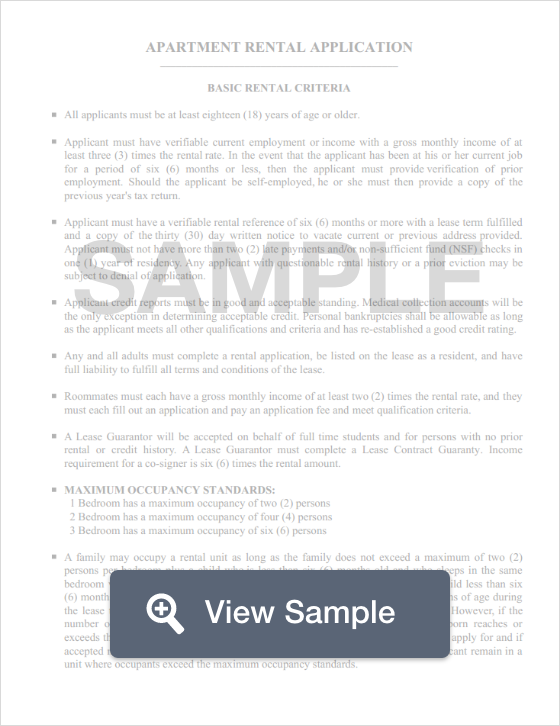Make a Texas Rental Application
Create a Texas Rental Application with our customizable template!

What Is a Texas Rental Application?
A Texas rental application form is a valuable tool used by landlords and property managers to gather necessary information on all prospective tenants. Rental applications request information such as the applicant’s full name and address. They also ask for more personal information such as income, employment history, criminal history, rental history, and whether the applicant has any previous bankruptcies or past evictions.
Looking for other Texas documents?

Business
- Texas Non-Compete Agreement
- Texas Non-Disclosure Agreement
- Texas Promissory Note

Personal
- Texas Last Will and Testament
- Texas Living Will
- Texas Power Of Attorney

Real Estate
- Texas Bill Of Sale
- Texas Eviction Notice
- Texas Lease Agreement
- Texas Month-to-Month Lease Agreement
- Texas Quit Claim Deed
- Texas Sublease Agreement


Sample Texas Rental Application


Search Documents
Related Documents
Looking for other Texas documents?

Business
- Texas Non-Compete Agreement
- Texas Non-Disclosure Agreement
- Texas Promissory Note

Personal
- Texas Last Will and Testament
- Texas Living Will
- Texas Power Of Attorney

Real Estate
- Texas Bill Of Sale
- Texas Eviction Notice
- Texas Lease Agreement
- Texas Month-to-Month Lease Agreement
- Texas Quit Claim Deed
- Texas Sublease Agreement
The Texas Rental Application Process
A rental application helps to serve as tenant selection criteria to minimize the risk presented in entering into a residential lease. Since many landlords will run a credit or background check, there is generally a non-refundable fee to submit each rental application (typically between $25 and $75).
For certain criminal history matters, such as an applicant being on a sex offender registry, landlords may find it prudent to get legal advice to determine whether they are within their legal rights to decide whether they wish to enter into a rental agreement with the potential tenant. Certain criminal matters, such as being a sex offender, may involve laws about school and daycare locations.
If there is a co-applicant, they may need to fill out a separate application and pay an additional fee. Texas rental applications must comply with federal fair housing laws and state landlord-tenant laws, so they do not discriminate against potential tenants.
Need a roommate? Then you need a roommate agreement! Download a roomate agreement now!
A Sample Texas Rental Application with Examples for Each Step
A Texas rental application form houses the landlord's tenant selection criteria. It's essential that it includes the right sections to gather information to determine if the prospective tenant is an acceptable risk before you enter into a rental agreement with them. The rental application should include:
- A section to gather the personalinformation of the applicant. Include their full legal name, date of birth, social security number, cell phone number, work phone number, email address, and emergency contact information.
- A section to gather their rental history, starting with their current full address. This section should also ask how long they've lived at their current address, the amount of monthly rent they pay, and their landlord’s name and contact information. Then, include additional spaces to gather previous rental history as well as contact information for previous landlords.
- A section for their employment history, starting with their current employer. Include the employer's name and address, the applicant's job title, how long the applicant has worked for the employer, the applicant's supervisor’s name, and the phone number for the supervisor or human resources. Include additional spaces to collect previous employment history.
- Request all current income sources, the type of each income source (for example, a paycheck), how often each income source is received, and the amount of each income source. Next, request the applicant to disclose whether they have checking or savings accounts and which banks or credit unions manage those accounts.
- A section to gather information about the applicant's vehicles, starting with how many vehicles they own. Then, get a description of each vehicle. The description should consist of the year, make, model, color, and license plate number of each vehicle. For rental properties that rely on parking passes or that have limited parking, knowing which vehicles belong on the property can be very beneficial.
- Gather the name and age of each person who will live with the applicant in the rental unit.
- A section that asks the applicant whether they have pets, how many, the type, and their size.
- A section for the authorization that allows you to run a background check and credit check. The applicant's signature permits you to complete those checks. This section is also ideal for reminding the applicant that the fee they paid is non-refundable.
- A signature line for the applicant's signature and a blank space for the date.
Rental Application Resources for Tenants in Texas
If you're a renter in Texas, you're involved in a legal contract known as a rental agreement or a lease agreement, even if it wasn't put into writing. Many renters feel like the landlord has all of the power, but Texas landlord-tenant law does provide you with rights. Here are some helpful websites:
- TexasLawHelp.org provides information on mobile homes, housing discrimination, public housing, and more. They also have forms and articles related to landlord-tenant issues.
- The Attorney General's website provides an easy-to-understand explanation of your rights as a renter. It also allows you to file a consumer complaint.
- The Texas State Law Library keeps an up-to-date list of free and low-cost legal assistance organizations, dispute resolution centers, and legal advocacy organizations. They also provide a web page devoted to legal clinics that offer free or low-cost legal assistance. The clinics are divided by county.
- The Texas Judicial Branch provides a web page dedicated to low-cost legal resources, including the opportunity to have a 30-minute consultation with a lawyer for $20.
- The official website for the City of Austin provides a web page dedicated to resources for renters. It includes a plain English version of a landlord-tenant guide.
- Volunteer Legal Services of Central Texas offers free legal assistance for qualifying individuals struggling with landlord-tenant issues.
Texas Rental Application Laws
The State of Texas doesn't set a maximum amount that landlords may charge as a security deposit. However, Texas law states that landlords must return a security deposit to a tenant no more than 30 days after they vacate the premises (Texas Property Code Annotated § § 92.101 to 92.109).

Create a Texas Rental Application in minutes with our professional document builder.













